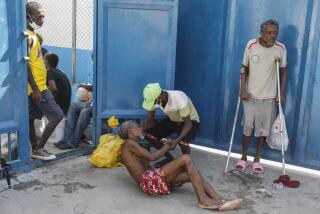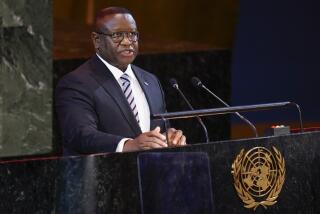Trinidad Militants Report Seizing Cabinet, Premier : Caribbean: Radical Muslim leader cites the island’s poverty as a reason for the action.
PORT OF SPAIN, Trinidad — Muslim militants said they seized the Parliament building in this Caribbean capital Friday and were holding the prime minister and his Cabinet hostage.
Imam Yasin Abu Bakr, head of a black rebel group called Muslim Meen, had a station newscaster read a statement on national television in which Bakr announced the uprising and claimed to be holding captive in Parliament the prime minister of Trinidad and Tobago, A. N .R Robinson.
Later, an announcer on Radio 610, Dennis McComie, quoted Abu Bakr as having said that his motive for moving against the government was “poverty and the destruction of Trinidad”--without elaborating on what that meant.
There has been no official reaction from the Trinidad government, but late Friday in Washington, State Department spokesman Dave Denny said, “We would deplore any attempt to overthrow the democratic government of Trinidad.”
He also said, “Our embassy reports gunfire in the vicinity of the TV station. Explosions and gunfire have been heard downtown.”
There were unconfirmed reports of casualties in this city of 300,000 although Denny said he had no word about the situation of Americans in Trinidad. Trinidad’s smaller island of Tobago is a popular vacation site.
Abu Bakr said there was no plan for violence, looting or retribution against civilians, McComie said.
The Muslim group claims to have 200 to 250 members. They are known as a small, militant group with connections to Libya that are said to include some funding.
The rebel statement said the Cabinet also was being held hostage with Robinson, 63, a veteran political leader, lawyer and economist, but it could not be ascertained how many were inside the Parliament building.
Trinidad’s ambassador to the United States told CBS Radio in Washington that Robinson and the entire Cabinet, which had been meeting at the time, were believed in the custody of the rebels.
A radio station in Trinidad, government-owned National Broadcasting Service, said police headquarters in downtown Port of Spain were blown up Friday by the rebels. The rebels are based in St. James, outside the capital, and near police headquarters.
McComie said the central police station was on fire and that there had been several explosions that he assumed was ammunition. No one was trying to put the fire out, and it was spreading to surrounding structures, he said, adding that it appeared headed for the telephone company.
James Fadelle of Miami said he spoke with a friend in Port of Spain by telephone earlier Friday evening.
“They’re all locked up in their houses. They cannot go outside,” Fadelle said. He added that his friend, Peter Lambie, had told him that some civilians were killed in the downtown area and two police stations were blown up.
McComie said he was in the street by the radio station at 6 p.m. when he heard gunshots inside Red House, which is the Parliament building. He said he returned safely to the station but that two gunmen entered and set fire to the engineering department.
McComie said radio employees were able to extinguish the fire.
“We can see people in the streets with guns,” he added.
The rebel leader, Abu Bakr, is a former police officer in Trinidad. Little is known about him. Reports published in Trinidad say he spent some time in Libya.
Trinidad, the larger of the two islands in the nation of Trinidad and Tobago, has a population of about 1.3 million and is just off the northeast coast of Venezuela. The nation gained independence from Britain in 1962.
About a third of the people are Roman Catholic and a quarter are Hindus. Only about 6% are Muslim. Blacks form the largest racial or ethnic group, followed by East Indians.
The island in recent years has suffered from a recession, with the closing of oil refineries, devaluation of the local currency and a new, unpopular, 15% value-added tax, according to locals.
The rebel group in the last year has been occupying some government land in western Port of Spain, creating controversy and tensions on the island.
The 1,500-member army had apparently not yet entered the fray and is said to be in northwestern Trinidad.
More to Read
Sign up for Essential California
The most important California stories and recommendations in your inbox every morning.
You may occasionally receive promotional content from the Los Angeles Times.










